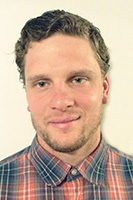 Kraszewski
Kraszewski
Gracjan Kraszewski is a Ph.D. student in history at Mississippi State University. As one of Cushwa's 2015 Research Travel Grant recipients, he traveled to Notre Dame to use the archives for his dissertation, which is titled "Dogma and Dixie: Southern Catholics and the American Civil War." Cushwa's Heather Grennan Gary caught up with him after his research trip.
To start, tell us about your project.
My work studies Southern Catholics’ spiritual and Confederate allegiances during the war. The main characters are bishops, Catholics on the battlefield (soldiers and chaplains), Sister-nurses, and diplomats. I argue that all these groups prioritized their faith above politics, but while they where largely uniform in their Catholicity, their Confederate allegiance greatly varied. Chaplains and soldiers were ardent Confederates. Bishops staked out a middle ground between faith and politics participating in both spheres. Sister-nurses were wholly apolitical and concerned only with providing spiritual and physical healing to the men they ministered to. My historiographical goals are, generally, to add a Catholic voice to Civil War religious scholarship and a Southern voice to American Catholic history while, more specifically, demonstrating that Catholics were just as involved in Confederate politics as were Southern Protestants.
How did you arrive at this topic?
My dissertation was originally going to be on Pope John Paul II’s visits to America (1979-99). I decided, in conjunction with my advisor, that this topic was more appropriate for a Ph.D. in theology or philosophy than my area of focus, history. I switched to my current topic because I had completed a course paper on Bishop William Henry Elder, of Natchez, Mississippi, and a main figure in my work, and had some foundational sources already in place. The topic also made sense because I am Catholic and was living in the South. I’ve been interested in the Civil War since I was young so it was a natural fit. I hope to return to the John Paul work once this is completed.
What collections did you look at while you were at Notre Dame? Were there any particularly valuable documents you uncovered?
My archive visit was perfect. I say this without exaggeration. The archive material was plentiful and it is an integral plank of my entire work. The dissertation would not be possible without my visit to Notre Dame. Additionally, the archive staff was extremely helpful and made it easy for me to find what I needed. Some collections that I found particularly useful were the Diocese of Richmond records, the Sisters of Charity of Nazareth (KY) collection, within which I found the invaluable Civil War journal of Bishop Martin John Spalding, and the newspaper holdings from the Baltimore Mirror and the U.S. Catholic Miscellany.
What other archives did you visited for this project?
I visited the archives of the Diocese of Charleston in South Carolina, the Catholic University of America in Washington D.C., and the Daughters of Charity Provincial Archives in Emmitsburg, Maryland. Also, Mississippi State is the home of the Ulysses S. Grant Presidential Library, which was a great source base right at home.
You received the Marszalek Graduate Student Award earlier this year, which meant you presented a lecture based on your research. Can you share a little about that experience?
I gave the Marszalek lecture in March of 2015. It was presented on campus in the Mississippi State library. I gave my talk before the main presentation by Dr. Victoria Bynum, who spoke on her book The Free State of Jones (UNC Press). My lecture, titled “Entangled Allegiance: Catholics in the Civil War South,” was just 12 minutes long--a one percent distillation, a true microcosm, of my entire dissertation. (You can watch the video here.)
Our grant application deadline is coming up in a few weeks. How did you learn about our research travel grants?
I found out about the Cushwa grants from Dr. James McCartin, who’s now at Fordham and who received his Ph.D. from Notre Dame. He was the professor for a history class I had at Seton Hall University in the fall of 2005. Dr. McCartin remains to this day one of my professional inspirations—brilliant man, great lecturer, and very kind, too. Even years after I had him in class he was willing to help me with my own development as a Catholic scholar—he especially assisted me in constructing a historiographical list for an American Catholicism paper I wrote in graduate school. He suggested I look into the Cushwa grant, so I applied.
Learn More>>
2015 Travel Research Grant recipients
Travel Research Grant information
Sisters of Charity of Nazereth, Kentucky Records